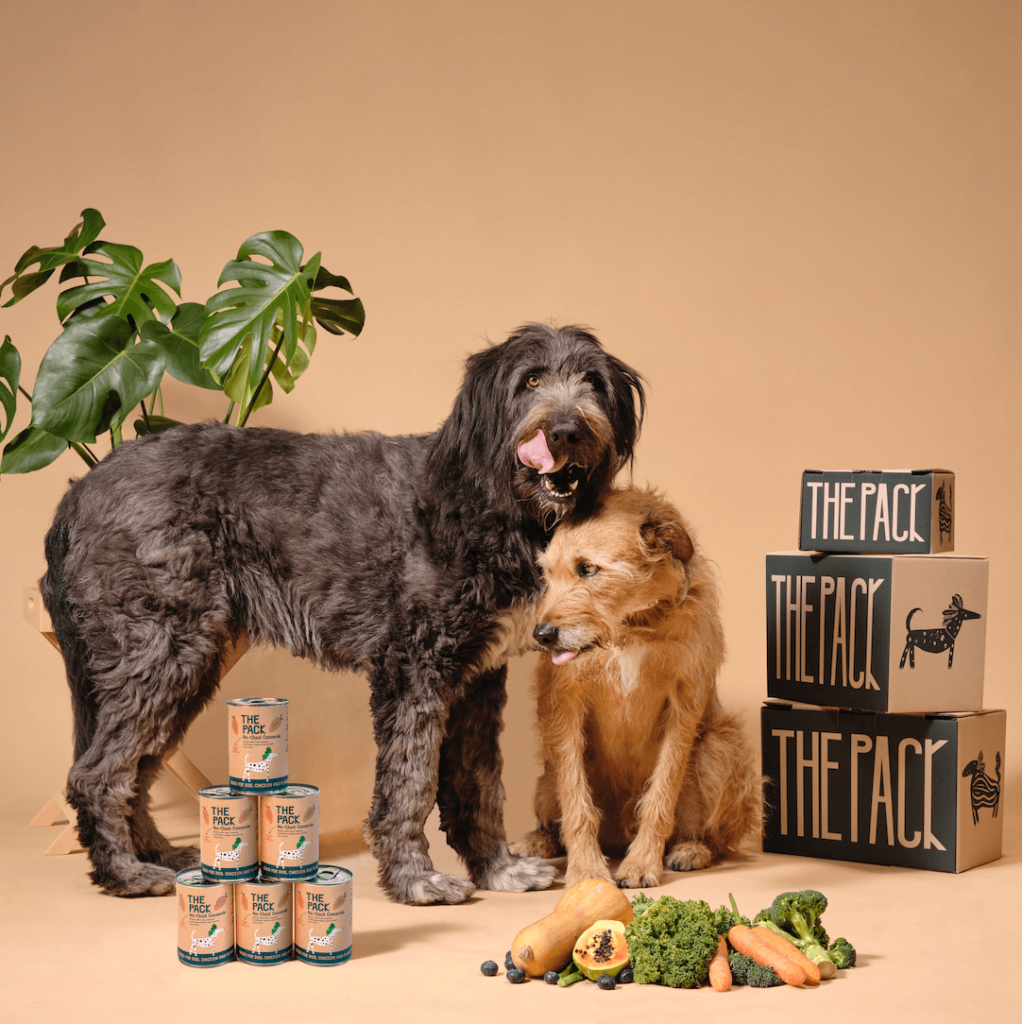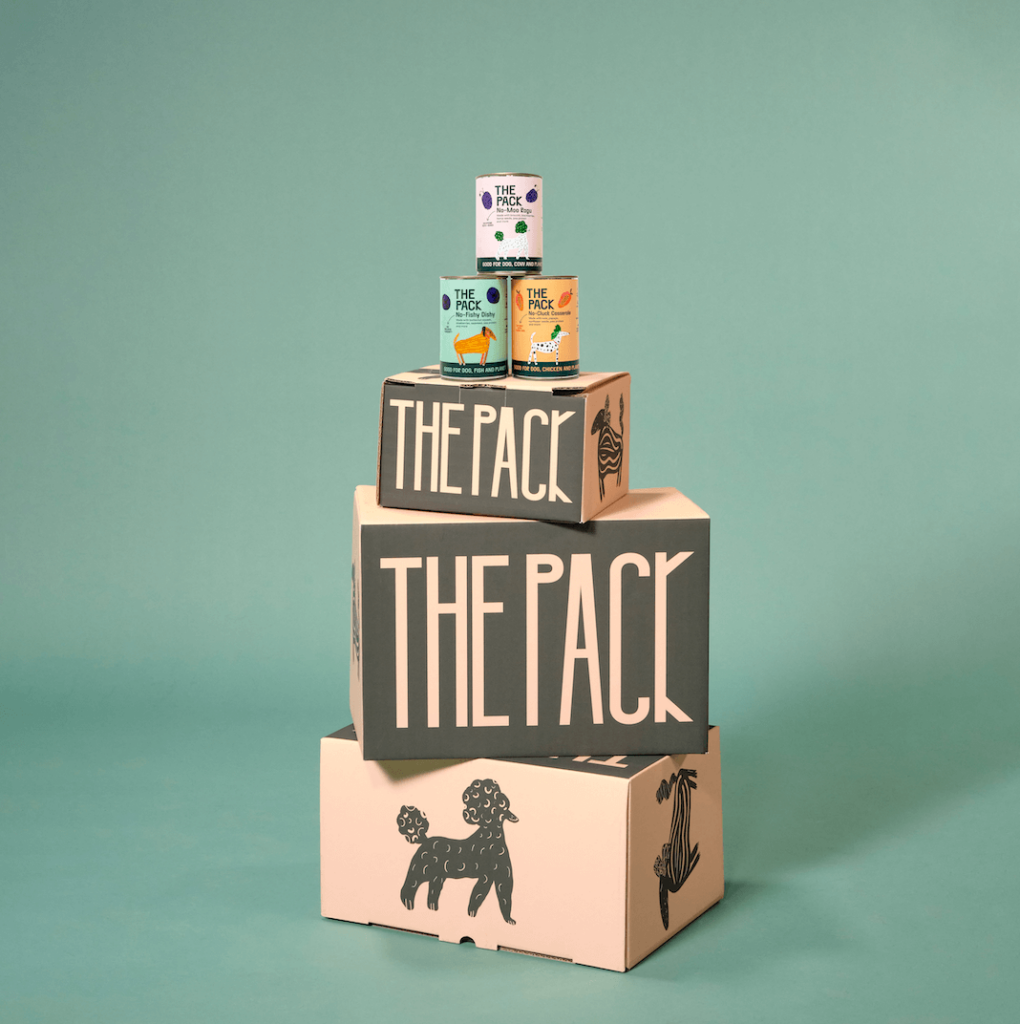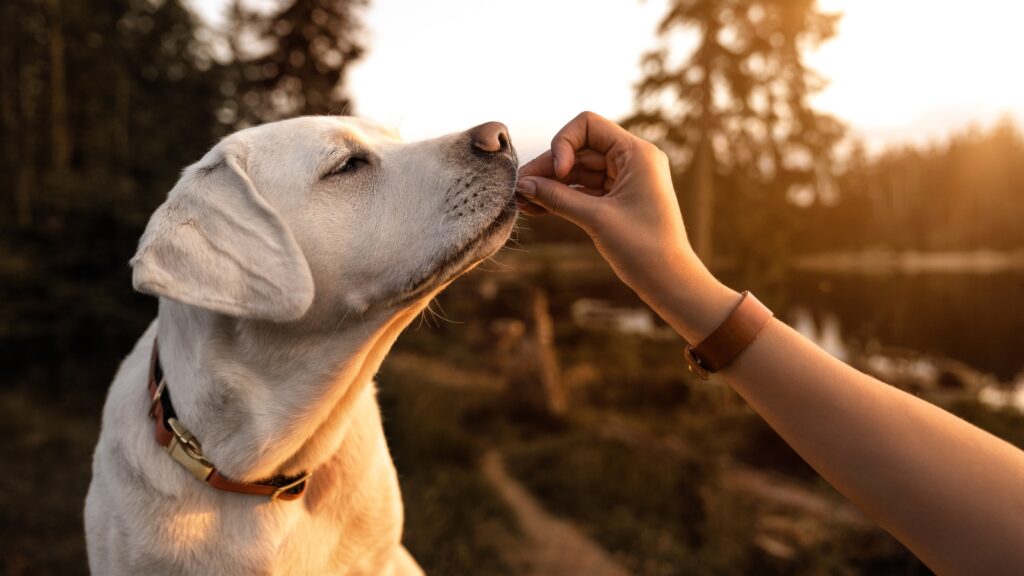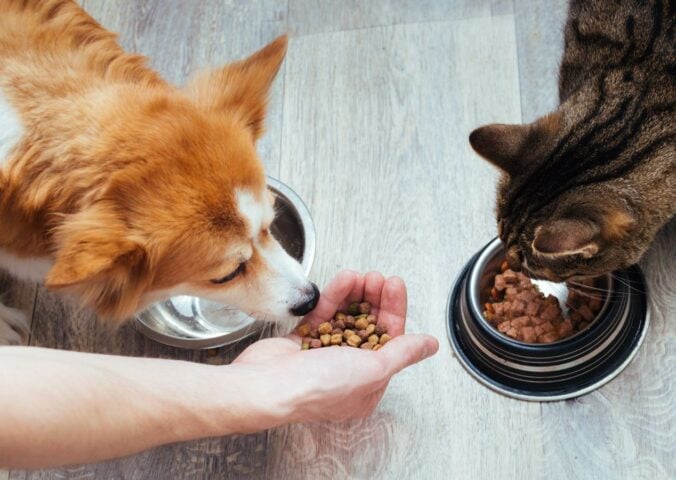This is a sponsored post * [what is this?]
If you’re vegan or vegetarian, it’s likely that you’ve felt some guilt when purchasing meat-based pet food for your dog, especially when most of us are feeding that meat every day – morning and night. For many of us, it doesn’t sit right with our ethical beliefs; for others, it contradicts our desire to do right by the planet.
At the same time, we’re in the midst of a health crisis when it comes to our pets. Rising cancer cases and growing rates of obesity are jeopardizing the long, active lives we all want our dogs to enjoy. And a growing number of veterinarians and animal nutritionists are telling us that a key culprit is high-fat, high-protein, meat-based dog food.
The current food system for dogs is broken. Sadly it’s estimated that one in four pet dogs will develop cancer. What’s more, as many as 51 percent of dogs in the UK overweight or obese. Overweight dogs are at risk of developing diabetes, arthritis, hypertension, kidney disease, and cancer. Research has found that those extra pounds can reduce a dog’s lifespan by 20 percent: an obese dog is likely to live up to two and half years less than a dog at a healthy weight.
Yet alternatives exist. A new generation of pet food companies are offering 100 percent plant-based dog food that offers all the nutrients your dog needs to thrive, minus the guilt, minus the obesity risks, and minus the unknown additives that may be making our pets sick.
We believe it’s natural for dogs to eat meat: but is it really healthy?
If you look under any social media post about plant-based dog food, you’re likely to see a long list of comments asserting that it’s unnatural to deprive “carnivorous” dogs of the meat they need to survive. Yet domestic dogs are actually omnivores, just like us: they have evolved over thousands of years to digest the starches in plant-based foods and receive all the nutrients they need without meat. Later in this article we explain exactly how the biology of dogs has evolved beyond their wolf ancestors.
One of the biggest myths of modern pet food marketing is that it’s healthy to be feeding our four-legged friends the natural diet of a miniature wolf. Phrases like “feed your dog’s inner wolf!” and words like “ancestral,” “biologically appropriate,” and “raw” persuade us that our Spaniels and French Bulldogs share the basic needs of fierce wild canids and would thrive on the same diet of meaty animal carcasses. This simply isn’t true.

A domestic dog has different nutritional needs to a wolf
Dogs actually began to evolve from gray wolves between 15,000 and 40,000 years ago; not only do today’s domestic dogs look different to wolves, their internal biology is different too. Researchers have found specific genetic “mutations” that allow dogs to digest and use starches found in plants within their bodies much more efficiently than wolves. These new genetic traits allowed even early dogs to thrive on a diet rich in plants, meaning our modern dogs are no longer strict carnivores: they have important genetic mutations that have adapted them to an omnivorous diet.
What’s more, gray wolves cover long distances in pursuit of prey and defending their pack from predators. Dogs’ wild ancestors would spend most of their day burning up calories by hunting down small mammals to eat, thus needing fatty, protein-dense meals of raw animal meat to refuel. This scenario bears little resemblance to how our relatively lazy domestic dogs receive their food.
A recent report showed that over 39 percent of dogs (that’s over 3.7 million) only get up to half an hour’s daily walk. Yet these dogs still receive at least two meals a day, placed at their paws without any physical exertion. Even when they’re walked for an hour a day, our Cavapoos and Collies don’t need all those meaty calories because they’re not living the naturally active lives of wolves.
There’s no advantage to giving dogs protein they don’t require (they can’t store the excess) and we’ve already seen that all that additional meaty fat is just making our dogs fat. High-meat diets are generally high-calorie diets, and calories count most when it comes to lifestyle causes of weight gain. That means that we need to dramatically rethink the kind of food that we’re feeding our pets if we want them to live long, active lives. Veggie dog food contains lower fat levels and more dietary fiber, which helps your dog maintain a healthier weight.
The dreaded C-word
Discovering cancer in our dog is every dog owner’s worst fear but, scarily, this is now the leading cause of death in dogs. A growing number of vets are linking high cancer rates to meat-based pet foods, with dogs suffering from the subtle, long-term damage of bioaccumulation. Chemical toxins in the environment build up (bioaccumulate) in animals the higher we move up the food chain. Put simply, when our pets eat other animals, they also consume the toxins those animals ate.
Furthermore, rancid fats, often present in commercial meat-based diets, are a leading source of free radical production in dogs. These free radicals, unstable atoms that can damage cells, have been linked to the development of cancer and arthritis. Plant-based food is free of rancid fats, instead providing antioxidant, cancer-fighting ingredients like blueberries, kale, hemp and sunflower seeds, seaweed, and broccoli.
These plant-based foods deliver nutrients like vitamin C, vitamin E, beta-carotene, and selenium, proven to build immunity and build healthy joints. Just ask Lewis Hamilton: he famously switched his bulldog Roscoe to a vegan diet after his dog’s arthritis worsened. On a plant-based regime, Roscoe’s swollen paws healed up and his joint pain appeared to ease. This is just one of many first-hand accounts of the positive impacts of removing meat from the dog bowl.
In 2015, the World Health Organization (WHO) warned that processed and/or red meat consumption is linked to cancer in humans, urging us to reduce the amount of meat we eat. Although there’s less research on the animal side, certain cancers have been explicitly linked with high-meat dog foods.
On the flipside, a scientific study of 300 vegetarian dogs found that no dog who had been “vegan” for more than five years had cancer. All this suggests that if we take the meat out of dog food, we reduce the risk of that dreaded C-word. It’s that simple.
The hidden “extras” in commercial meat-based food
Researchers and testimonials from plant-based dog owners list a wealth of potential health benefits of feeding plant-based dog food, including fighting allergies, building immunity, and making sure your hound lives to a long, healthy old age. A 2016 study summarizes the evidence supporting the health and safety of plant-based pet food But what it all boils down to is this: by taking the meat out of pet food, you’re also taking out a lot of nasty stuff.
Commercial meaty pet food is often made with the less appealing parts of the animal that humans can’t or don’t want to eat, like bones, fat, blood and feathers. These by-products are rendered: melted down into a meaty gruel before being dehydrated and made into kibble or mushed up with cereal and grains in cans. With rendered meat-based food you can’t see what you’re getting so all sorts of nasties can sneak in. Just Google “pet food recalls” if you want a sleepless night…
What about raw meat feeding? According to the British Small Animal Veterinary Association, American Veterinary Medical Association and the World Small Animal Veterinary Association, raw meat pet food can introduce bad bacteria like E. coli and Salmonella and even parasites into our pets and our homes. And while the high levels of fat might make your dog’s coat shiny, they also come with obesity risks.
With plant-based food, you know exactly what you’re feeding your pet, and those ingredients won’t come with a side order of salmonella.
We believe it’s “nice” for dogs to eat meat: but wouldn’t they prefer a more varied diet?
The stereotype of a dog happily gnawing on a bone is just one of many marketing images that create a subconscious message: my dog loves meat, and he or she will be sad and deprived without it. But is your dog really less happy eating plant-based food?
Not according to the science. A recent article surveyed 2,308 owners to find out how their dogs behaved towards their food: were their tails wagging as much? Did they dash up to their bowl? Were they barking with excitement? How fast did they eat? Taking all these things into account, the researchers found “no consistent evidence of a difference between vegan diets and either conventional or raw meat diets.”
Dogs don’t crave specific foods such as chicken or beef: they crave the nutrients within them. If we can deliver those nutrients without animal meat, our dogs should love their new plant-based food just as much as their old diet.
New plant-based startups are leading a revolution in plant-based pet food, creating food that’s tastier and more satiating than ever. And most excitingly, they’re offering a much-needed variety of tastes and textures beyond bland, meat-based kibble. After all, the images of juicy beef, fresh pink salmon or tender chicken breasts on conventional pet food packages generally have very little to do with the hard, brown kibbles or grayish mush inside.
When we consider that most dogs are eating the same meat-based meal, day in, day out – as well as meat-based treats – it’s clear that something needs to change. After all, would you want to eat the same food, every day for the rest of your life? Not only is it soul-destroying, but pet nutritionists agree that having variety is important in creating a healthy gut microbiome.
Secret sauce
How can we insist that “dogs crave real meat” when we’re feeding them animals that have been cooked and processed far beyond recognition? Why would our pets even want to eat this bland food? Well, many pet food manufacturers add a “secret sauce”: animal fat sprayed onto the food, or meat by-products treated with heat, enzymes and acids to form concentrated meat flavors.
These flavorings taste really good to pets but that doesn’t mean that they’re healthy or nutritious. After all, humans have also developed tastes for unhealthy, fatty, sugary foods but that’s not to say we should be eating them every day.
Of course, taste preference is unique to the individual: it’s unlikely that the humans you know enjoy all the same foods, so why should the dogs? We’d also get pretty bored eating the same food for every meal, day in, day out. The range of plant-based options available – from THE PACK’s “No-Moo Ragu” to HOWND’s fresh blueberry and coconut porridge – mean that you can feed your dog a variety of different flavors and textures, finding those they like best and mixing up mealtimes to keep it interesting.
We believe misinformation that feeding plant-based diets is breaking the law (not true!)
The shift to plant-based feeding hasn’t been helped by negative publicity around vegan diets after misinformed suggestions that feeding plant-based diets could be in breach of the UK’s Animal Welfare Act. This is simply not true: the Animal Welfare Act states that owners must feed a “suitable diet” meeting their dog’s nutritional needs. Absolutely nowhere are vegan or vegetarian diets mentioned as unsuitable.
To suggest that dogs, who are omnivores not obligate carnivores, need meat to be healthy, is unscientific. As veterinarian and animal welfare expert Professor Andrew Knight puts it, “The claim is that animals on vegan diets will necessarily become ill and it’s somehow cruel to maintain them, is contrary to the scientific evidence in this field and is ignorant.”

Do vegan dogs get enough protein?
If you’re vegan, you’re probably all too familiar with the question, “but where do you get your protein?” It will come as no surprise that “vegan” dogs are often subjected to the same cross-examination. In fact, because of the common misconception that dogs are obligate carnivores, the idea of a plant-based pup is even harder to stomach. So what’s the deal with dogs and protein?
According to current nutritional guidelines for dogs in Europe, the minimum amount of protein required for canine growth is 18 percent of daily food consumption. With dry kibble, you’ll see on the labels that protein makes up 18-25 percent of nutritional composition in most complete dog foods. With wet food, it will appear less due to the additional moisture content: once you remove that, the protein percentage is often even higher.
Protein molecules are molecular “strings” made up of 20 common amino acids. When dogs eat protein, their digestive system breaks down these strings into their amino acid building blocks, which are then used by your dog’s body to make lots of different proteins: the ones needed at any particular moment to build muscle, produce hormones or fight infection. If their diet contains enough of these amino acid building blocks, dogs can make half of the 20 amino acids on their own (including Taurine).
However, there are 10 amino acids that they can’t create, which means they must be eaten. A dog food must contain all of them in adequate levels to meet the official nutritional standards which allow the food to be labeled “complete”.
Is it just meat products that contain these ten essential amino acids? Of course not. High-quality plant protein sources, just like you find in complete vegan dog food, can also contain all ten. This isn’t just theory: last year, a study in a reputed veterinary journal compared the nutritional soundness of 19 meat-based and ten plant-based pet foods. What did it find? That plant-based diets were superior to meat-based diets.
The sheer number of healthy plant-based dogs today is testament to the science. You might have heard of Bramble, a Collie who once held the Guinness World Record for being the oldest living dog at 27 years of age. Like her owner, Bramble lived on a strict meat-free diet of rice, lentils, organic vegetables and that firm vegan favorite,”nooch”. So not only can dogs survive on plant-based food, time after time, they’ve been shown to thrive without meat.

The future of dog food
One dog guardian has seen her 15-month Vizla, Keaton, doing just that: not just thriving health-wise, but delighting in his “vegan” meals. Happy owner Sharon tells us, “He can’t get enough quickly enough, and he has the same keenness three days later, which is impressive. Now all I have to do is teach him table manners…”
Sharon has been feeding THE PACK, one of the leading companies in this emerging space. The London-based startup is on a mission to create the world’s most nutritious plant-based dog food that dogs love to eat. Healthy products that don’t compromise on taste is the mantra of THE PACK, which launched the world’s first plant-based meat-alternative wet food for dogs late last year. No more invisible nasties: open a can of THE PACK and you see exactly what you’re getting: visible lupin beans, chunks of butternut squash and other ingredients, easily identifiable as real food.
Founders Damien Clarkson and Judy Nadel are pet parents who were shocked by the extent of the health crisis in dogs. Clarkson and Nadel teamed up with world-leading experts in pet food nutrition, veterinarians and scientists, and set about building a company to transform pet health for the better.
It’s just one of a number of emerging pet food companies worldwide which are revolutionizing the industry with nutritious, delicious, ethical dog food that’s more than a match for meat-based alternatives. When creating their innovative range of wet-dog food, Clarkson explains, “We set our animal nutritionists the challenge of matching the protein levels of meat products with a plant-based wet food. This process took a lot of time, but together with world-leading experts we were able to bring a high-protein wet food to the market.”
Palatability is also something Clarkson and Nadel are obsessed with. Nadel explains: “Dogs deserve to enjoy their food! We are constantly working with experts in dog palatability to innovate on taste and create products that dogs deserve and love.” She added that the response to THE PACK’s first products available through their website www.thepackpet.com has been amazing: “We have had so many pet parents sharing videos and images with us of their dogs loving the food. We’re even getting raw feeders as customers, who love our products for variety in their dogs’ diets.” If advocates of raw meat food are seeing the benefits of plant-based feeding, we’re on the cusp of real change.

When we consider the health benefits of a plant-based dog diet and all the exciting new options available, it seems crazy to keep feeding our dogs meat. If we can safely nourish our dogs in a way that doesn’t harm another animal, while at the same time enhancing their health and happiness, why wouldn’t we?
New meat-free dog food alternatives are popping up every day, helping us to expand our circles of compassion to give all animals a better life, not just pets. Because in the end, the purchase of each can of dog food represents a choice about how a cow, chicken, pig, or fish lives and dies.
For those of us who have removed animal products from our own diets, game-changing new start-ups are proving that there’s no reason at all to keep feeding them to our dogs – and every reason to stop.
PBN has teamed up with THE PACK to offer 20 percent off your first purchase of its meaty, plant-based wet food for dogs. Simply use the code PBN20 when you check out at www.thepackpet.com
* This is paid-for content; funds from this article help Plant Based News continue to provide millions of people around the world with free content they know and love. We only work with brands we support and use ourselves.






